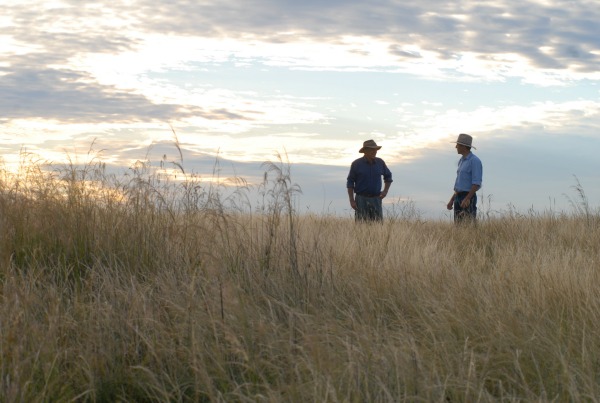There’s so much to be said for getting our head in the right space with regard to running a profitable and regenerative farm business. Now I think you’re going to be open to this, because I have generally found that those of us who are brave enough to break away from ‘the norm’ of how things are done in the paddock, are also conscious enough to consider some self-development of the mind. We don’t just aim for our farms to be sustainable, but regenerative right? Well shouldn’t we aim for the same in other parts of our lives? Do you aim for your relationships with friends and spouses to be just sustainable? Of course not, we want them to be regenerative, and so it is true with our minds.
I have personally learnt how to be more accountable in our farm business and it is really empowering as well as helpful for the business. I used to think I was fairly accountable and not one to blame – and in the old way that I defined blame, I probably wasn’t; but I have since realised what it means to be fully accountable when things haven’t gone to plan.
When we fully accept accountability, it is empowering because it puts the ball in our court to be able to fix an issue. When we blame however, we are handing over the power to fix a problem to another person, which makes us feel somewhat helpless. Read this paragraph again.
In handing the power (and responsibility) of fixing a problem over to someone else, they may or may not do something about it – it is out of our control. This is not good enough for our businesses. Let’s face it, in our businesses we want to leave as few things to chance as possible, so being accountable will help us take charge in our businesses and ensure outcomes.
Let me give you an example from our farm business.
Accountability in our business
We direct market our grassfed beef, and as a part of this business, we have our boxed, grassfed beef freighted around the southeast of Australia – NSW and southern Queensland. On the farm, we are really conscious about how we care for our animals, how we care for our land and how we produce our beef, and we want this care reflected in the delivery part of the process too. So, we want the beef delivered on time for two reasons:
- it reflects our values of care, that when we say it will be delivered to our customers, it is
- it is a perishable – we can’t afford to have it sit in a fridge somewhere for days.
Currently, we are reliant on outside, existing freight companies for our deliveries.
We have had some challenges with having the beef picked up or delivered at the time when we have requested it so. In the past (providing we had filled out all the correct paperwork and done all requested by the freight company) we were quietly blaming the freight company for not doing their job and responded to this by simply asking them if they could please get it right next time.
More recently, we are now fully accountable for ensuring freight delivery on time. Derek and I think about what we can change to ensure timely delivery and ask ourselves some questions.
- How can I have communicated better when I wanted the beef picked up and how important it is that its delivery is timely?
- Can I ring the freight company and ask them, Did I do everything I needed to do to have our beef picked up on time? What else can I do to ensure the timely delivery of our beef?
- Have I been communicating with the most appropriate person in the freight company?
- Is there a better system I can put in place with the freight company about instructions for delivering our beef?
- Explain to the freight company the importance of a timely delivery and ask them, ‘Is there an extra system that we can work out together to ensure this occurs?
Can you see that this empowers me to fix the problem, rather than just hoping next time that they will get it right?
Another example
Your example may be that one of your staff (or family) is planting a crop and has just worked for 20 minutes whilst run out of seed or with a blockage. (Now I know you mostly have monitors for this these days, but I’m sure you’ve been here in the past). Even if you had explained to them to make sure this doesn’t occur, how could you have communicated that better? Instead of blaming them (either internally or externally), you could ask yourself ‘What systems could I put in place that remind my worker to check this particular thing?’
Maybe you could set up a written procedure for ‘driving the tractor at planting time’ that hangs in the tractor as an easy reference. The things that you know to check may not occur so readily to other people.
Sometimes we also blame ourselves. If you were the one on the tractor planting and you ran out of seed and were hard on yourself for such a silly mistake, don’t be. Instead, see what there is that you can change about that operation that means it won’t happen again.
The other beauty of taking accountability and seeing how there is a better way to do something is that it will likely improve the efficiency of your farm business.
Taking accountability and setting up a procedure or template for how things are done should mean:
- problems are more often avoided
- it is easy for someone else to step into your role because they can easily follow your procedures for how things are done. This could be relevant if you:
- have a staff change
- go on holidays and someone else takes over while you are away
- want to grow your business. In order for your business to grow, you can’t always be the one driving the tractor.
McDonalds restaurants do this to a T. Now I know we may not share values about food and eating with McDonalds but we can learn other things from them. They operate with a specific set of procedures, where each person is accountable for a number of tasks. Each task has a strict set of procedures associated with it. Let’s face it, they always get consistent, timely, reliable output. They can even have many staff changes, with essentially low skilled labour, and still they get their reliable outputs.
What about you?
Have a think about when you last had something not go to plan. Did you blame? Is there any way you could be more accountable in dealing with such problems?
It is important that we as business owners have the associated business skills. The way that many of us come into farming – means that we are good at practical work, but not always good at the business side (and this can be said for many small businesses – a hairdresser opens her own salon – she is great at cutting hair, but can she manage a business?). There is always something that we can improve on.
Let me know what you think of this blog – does it help you to get your mind ticking about how to do things better, or would you just rather I stick to the stuff in the paddock?


Kirrily,
I think your divergence from direct farm issues on an occasional blog is great, I agree with the focus of this article – I am big on procrastination at times, but also have believed for most of a lifetime in the 10 little magic words -
`If it is to be it is up to me’